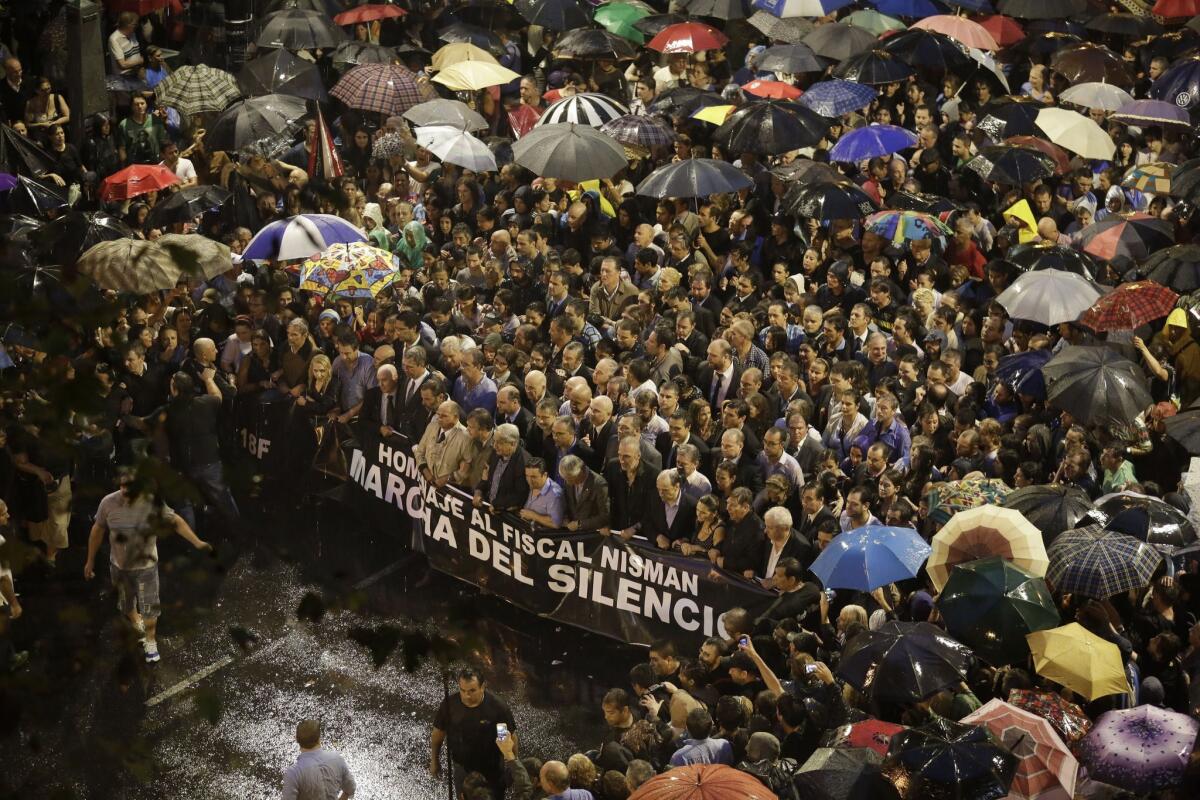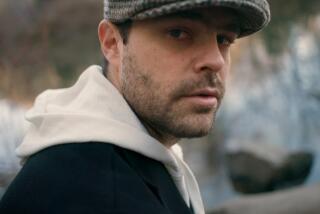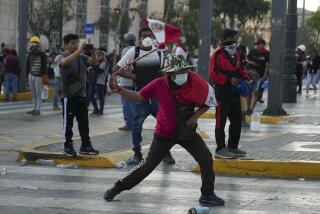Thousands march in honor of deceased Argentine prosecutor

- Share via
Reporting from Buenos Aires — Tens of thousands of demonstrators marched through Argentina’s capital on Wednesday in tribute to a prosecutor who died a month ago after accusing President Cristina Fernandez de Kirchner of a coverup in the 1994 bombing of a Jewish community center.
Marchers at the head of the procession carried a huge banner in honor of Alberto Nisman reading: “Homage to prosecutor Nisman. March in silence.”
Buenos Aires police estimated as many as 250,000 people participated in the march, which encountered torrential rain. Some participants carried placards reading “Truth and Justice,” “Thank you, Nisman,” and “I am Nisman.”
Nisman was found dead of a gunshot wound to the temple Jan. 18. Although initial phases of the investigation indicated a suicide, subsequent evidence led Fernandez and others to publicly declare they suspect he was slain.
The march was called by a group of prosecutors, judicial workers, intellectuals and opposition leaders and led by Nisman’s two daughters and federal Judge Sandra Arroyo Salgado, Nisman’s ex-wife. Salgado has also said she believes Nisman was killed.
At the time of his death, Nisman headed the investigation of the 1994 bombing of the Argentine Israelite Mutual Assn., or AMIA, community center. The attack killed 85 people and injured at least 150. The case remained unsolved although he issued arrest warrants in 2006 for eight suspects in connection with the bombing, the worst terrorist attack in Argentina’s history.
Nisman alleged that Iranian officials gave financial and logistical support to members of the Hezbollah terrorist group, who he said placed the bomb. Four days before he died, he told an interviewer that he suspected Fernandez and Foreign Minister Hector Timerman of making a deal with Iranian government officials to absolve them of the crime, possibly in exchange for favorable trade terms.
As of Wednesday, Nisman’s death still had not been declared a homicide or suicide. The route of the Wednesday march took participants past Plaza de Mayo, in the vicinity of Argentina’s Congress and Nisman’s office. Marches were also held in Mar del Plata, Mendoza, Cordoba and Rosario.
Hours before the march, Fernandez spoke on national television to open a nuclear power facility, but made no reference to Nisman and the bombing case. Nor did she make mention of the statement this week by prosecutor Gerardo Pollicita that he was continuing to investigate Fernandez on suspicion of a coverup.
Pollicita said he was basing his inquiry on 300 pages of evidence gathered by Nisman that he said implicated Fernandez. Nisman was to have presented the documents to a congressional committee the day after his death.
A recent poll indicated that a majority of Argentines believe the Fernandez government was somehow responsible for Nisman’s death. Fernandez has denied such charges and theorized that Nisman was manipulated by rogue intelligence officials seeking to damage her politically.
Shortly before the march began, it was learned that a key witness in the Nisman case, Antonio “Jaime” Stiuso, the former operations chief of the Secretariat of State Intelligence, gave testimony to prosecutors investigating the case.
Stiuso, who worked closely with Nisman on the AMIA investigation, is known to have talked with Nisman several times in the hours before his death. Details of his testimony were not disclosed.
Special correspondents D’Alessandro and Kraul are based in Buenos Aires and Bogota, Colombia, respectively.
More to Read
Sign up for Essential California
The most important California stories and recommendations in your inbox every morning.
You may occasionally receive promotional content from the Los Angeles Times.










